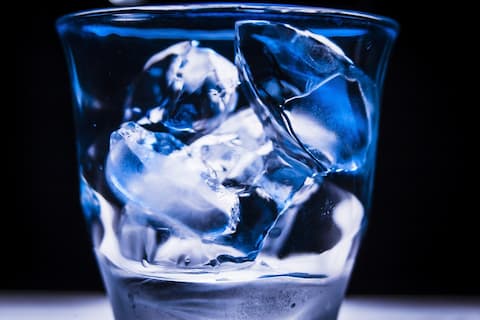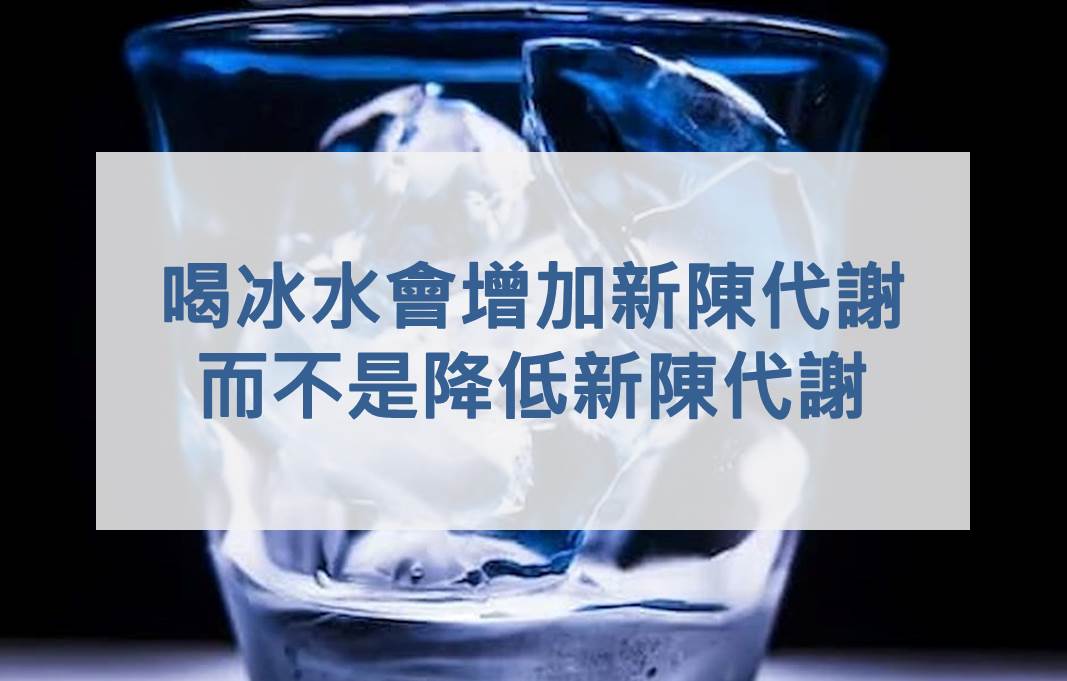前幾天上節目,有位美食老師說:「喝冰水後會讓新陳代謝下降…」,一旁的營養師聽了似乎也沒意見。我忙著講其他的內容無暇他顧,事後回想,當時應該指出正確的事實的。

冰水與減肥
「喝水會增加新陳代謝」和「吃冰會使新陳代謝下降」這兩個觀念藉由網路的傳播,變成許多人深信不移的想法。所以我常聽到一些專家在電視上叫人要多喝水,因為喝水「會讓新陳代謝增加,可以幫助減肥」。現在又常聽到專家建議大家不要喝冰水,因為喝冰水「會降低新陳代謝」,是這樣嗎?
喝冰水可以增加新陳代謝
2006年「臨床內分泌新陳代謝期刊」登出一篇國際論文,題目是:「喝水促進新陳代謝的再思考:水溫對能量消耗的影響」,實驗在一所大學的生理實驗室內進行,對象是健康的成年人。喝水前30分鐘先測量新陳代謝一次,喝水後90分鐘再測量一次。喝水的水量是每公斤7.5ml,每個人每次大約喝518ml,包括蒸餾水、生理食鹽水和冰水。冰水的定義是溫度3度C的無糖水,在實驗室通常會用蒸餾水,以免雜質對實驗的干擾。結果發現,喝水,不管是喝蒸餾水〈類似礦泉水〉或生理食鹽水都不能增加新陳代謝。喝低溫達3度C冰水後可增加新陳代謝4.5%,並且可持續60分鐘。
有科學根據的減肥方法
原因是喝了冰水後,身體的熱量被冷水吸收掉一部分,身體必須增加產熱來應付溫度的流失,所以會有短暫升高新陳代謝的現象。一旦水溫上升到體溫,這種新陳代謝增加的現象就會消失。所以,喝冰水並不會降低新陳代謝,相反的,會有短暫的新陳代謝升高的現象。網路世界無奇不有,許多未經科學試驗證實的傳說到處被轉載,一些人也就這樣相信,甚至還幫忙轉載。唯有拿出有實證醫學為根據的科學論文,才能打破這種謠言。
■上述論文,是藉由新陳代謝儀檢測的檢測得知,請查看新陳代謝儀相關資料
♥原著論文如下:
J Clin Endocrinol Metab. 2006 Sep;91(9):3598-602. Epub 2006 Jul 5.
Water-induced thermogenesis reconsidered: the effects of osmolality and water temperature on energy expenditure after drinking.
Brown CM1, Dulloo AG, Montani JP.
Author information
Abstract
CONTEXT:
A recent study reported that drinking 500 ml of water causes a 30% increase in metabolic rate. If verified, this previously unrecognized thermogenic property of water would have important implications for weight-loss programs. However, the concept of a thermogenic effect of water is controversial because other studies have found that water drinking does not increase energy expenditure.
OBJECTIVE:
The objective of the study was to test whether water drinking has a thermogenic effect in humans and, furthermore, determine whether the response is influenced by osmolality or by water temperature.
DESIGN:
This was a randomized, crossover design.
SETTING:
The study was conducted at a university physiology laboratory.
PARTICIPANTS:
Participants included healthy young volunteer subjects.
INTERVENTION:
Intervention included drinking 7.5 ml/kg body weight (approximately 518 ml) of distilled water or 0.9% saline or 7% sucrose solution (positive control) on different days. In a subgroup of subjects, responses to cold water (3 C) were tested.
MAIN OUTCOME MEASURE:
Resting energy expenditure, assessed by indirect calorimetry for 30 min before and 90 min after the drinks, was measured.
RESULTS:
Energy expenditure did not increase after drinking either distilled water (P = 0.34) or 0.9% saline (P = 0.33). Drinking the 7% sucrose solution significantly increased energy expenditure (P < 0.0001). Drinking water that had been cooled to 3 C caused a small increase in energy expenditure of 4.5% over 60 min (P < 0.01).
CONCLUSIONS:
Drinking distilled water at room temperature did not increase energy expenditure. Cooling the water before drinking only stimulated a small thermogenic response, well below the theoretical energy cost of warming the water to body temperature. These results cast doubt on water as a thermogenic agent for the management of obesity.
PMID: 16822824 [PubMed – indexed for MEDLINE]

